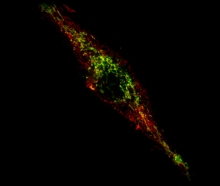Researchers have identified the genetic mutation responsible for one patient's serious health problems, finally solving a medical mystery that has endured for over 30 years. Thanks to this discovery, the researcher developed a therapy that could also help a lot of people who have problems related to the immune system, whether they are genetic or due to a transplant or an illness.


Remembering Carrie Derick on Women's Day

Research and clinical care complement each other at The Neuro
February 28th was Rare Diseases Day, an opportunity to recognize a class of disease that is often overlooked. In the past five years, the Montreal Neurological Institute and Hospital (The Neuro) has made the study and treatment of rare diseases a major priority, hiring new specialists and support staff and coordinating activity under a new research group.

Researchers have linked a debilitating neurological disease in children to mutations in a gene that regulates neuronal development through control of protein movement within neuronal cells.

Two researchers at the Montreal Neurological Institute and Hospital (MNI) of McGill University have received funding to study a devastating neurodegenerative disease that first appears in toddlers just as they are beginning to walk.

You probably know someone who has it. It is the most common movement disorder, yet most people don’t even know its name.
Essential tremor affects nearly one per cent of the world’s population, increasing to four per cent of those over 40. The involuntary shaking of hands is the most common symptom, but symptoms can also include shaking of the head and legs.

A team of scientists led by Dr. Michel Desjardins from the University of Montreal and Dr. Heidi McBride from the Montreal Neurological Institute and Hospital (MNI) at McGill University have discovered that two genes associated with Parkinson's disease (PD) are key regulators of the immune system, providing direct evidence linking Parkinson's to autoimmune disease.
Using both cellular and mouse models, the team has shown that proteins produced by the two genes, known as PINK1 and Parkin, are required to prevent cells from being detected and attacked by the immune system.

Study examines genetic data to analyze regional differences in ancestry
A new study of genomic diversity in the U.S. clarifies the role of pre-Civil War admixture and early 20th century transit routes in shaping the migration history and genomic diversity among African-American communities. The research by McGill University professor Simon Gravel and colleagues, was published May 27 in PLOS Genetics.

Scientists at the Montreal Neurological Institute and Hospital (MNI) have identified novel gene mutations that cause hereditary spastic paraplegia (HSP), a step forward in efforts to treat this debilitating disease.
It is estimated that between two and 10 people per 100,000 in the general population have HSP, a disease characterized by weakness or spasticity in the lower limbs. HSP is caused by mutations inherited from one or both parents.
It is all about finding the right person. More than 20,000 organ transplants have been performed in Canada over the last 10 years and routinely extend lives. But sometimes the recipient’s immune system recognizes the new organ as foreign and rejects it, which can lead to serious complications.
The dedicated work by Dr Nancy Braverman is featured in this New York Times article on children with RCDP, a rare and devastating disease.

Despite numerous genomic studies, evidence for a genetic contribution to cardiovascular disease disparities in blacks versus whites provide little insight

McGill University Professor Philippe Gros has been awarded the McLaughlin Medal from the Royal Society of Canada for important research of sustained excellence in medical science.

